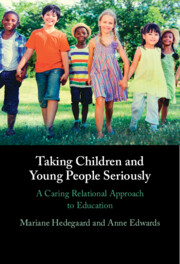Book contents
- Taking Children and Young People Seriously
- Taking Children and Young People Seriously
- Copyright page
- Contents
- Figures
- Tables
- Chapter 1 Taking Children and Young People Seriously
- Chapter 2 A Cultural-Historical Approach to Children’s Development and Childhood
- Chapter 3 Working Relationally with Other Professionals and Families
- Chapter 4 Very Young Children
- Chapter 5 Care and Education in Kindergarten with Play as the Core Activity
- Chapter 6 Engaging with Knowledge When Starting School
- Chapter 7 Caring Approaches to Pedagogy
- Chapter 8 The Primary School Age
- Chapter 9 Developmental Teaching as a Double Move between Subject Knowledge and Children’s Appropriation of Personal Knowledge
- Chapter 10 Adolescence and Transitions into Early Adulthood
- Chapter 11 A Caring Relational Approach to Education
- References
- Index
Chapter 11 - A Caring Relational Approach to Education
Implications for Practice and Policy
Published online by Cambridge University Press: 08 June 2023
- Taking Children and Young People Seriously
- Taking Children and Young People Seriously
- Copyright page
- Contents
- Figures
- Tables
- Chapter 1 Taking Children and Young People Seriously
- Chapter 2 A Cultural-Historical Approach to Children’s Development and Childhood
- Chapter 3 Working Relationally with Other Professionals and Families
- Chapter 4 Very Young Children
- Chapter 5 Care and Education in Kindergarten with Play as the Core Activity
- Chapter 6 Engaging with Knowledge When Starting School
- Chapter 7 Caring Approaches to Pedagogy
- Chapter 8 The Primary School Age
- Chapter 9 Developmental Teaching as a Double Move between Subject Knowledge and Children’s Appropriation of Personal Knowledge
- Chapter 10 Adolescence and Transitions into Early Adulthood
- Chapter 11 A Caring Relational Approach to Education
- References
- Index
Summary
In this concluding chapter, we give a brief overview of the key themes in the book, emphasizing the importance of care in the relational pedagogy we have been discussing. We argue that practitioners should take children seriously by seeking their perspectives and identifying what matters for them while building common knowledge with them and working relationally to help take forward their social situations of development. But our primary purpose here is to look forward and consider the implications of the subtle skilled work we are advocating for practitioners. Care alone is insufficient. Practitioners who work with children and families need knowledge of child and adolescent development; subject matter knowledge in schools, and for other caring professionals their core professional knowledge, such as legal responsibilities for social workers; and knowledge of pedagogy. The professional interactions with children, families and other practitioners in a relational pedagogy are reciprocal, involving ongoing mutual engagement, where power differences are played down, and professional agency is crucial. Much therefore depends on how institutional leaders mediate government policies: Creating and supporting agentic responsive practitioners is a leadership responsibility. Questions of values therefore crucially underpin the ideas shared in this book.
Keywords
- Type
- Chapter
- Information
- Taking Children and Young People SeriouslyA Caring Relational Approach to Education, pp. 262 - 270Publisher: Cambridge University PressPrint publication year: 2023



